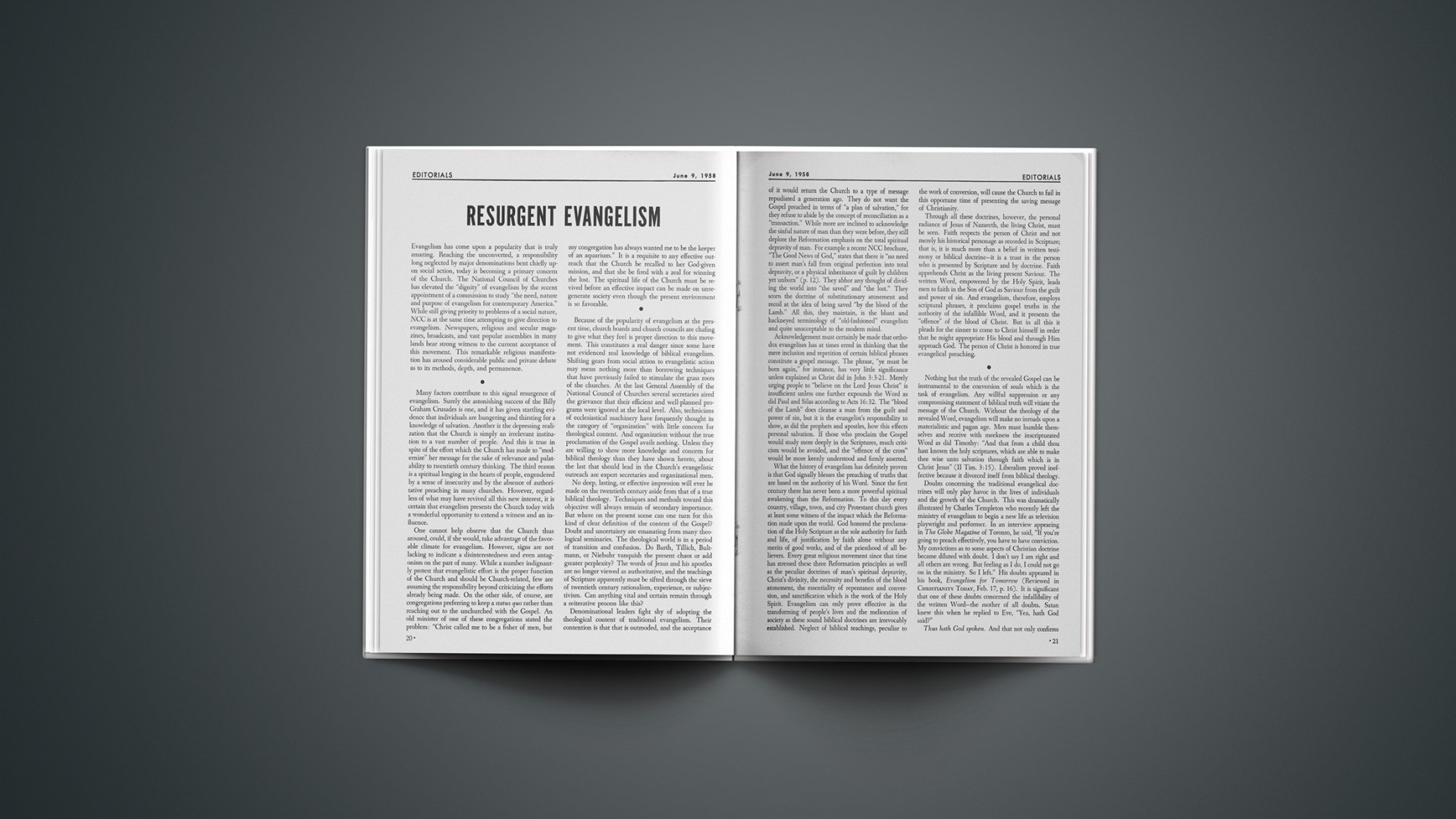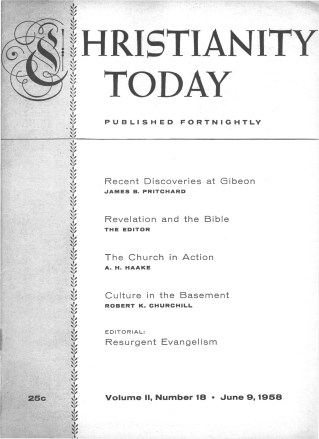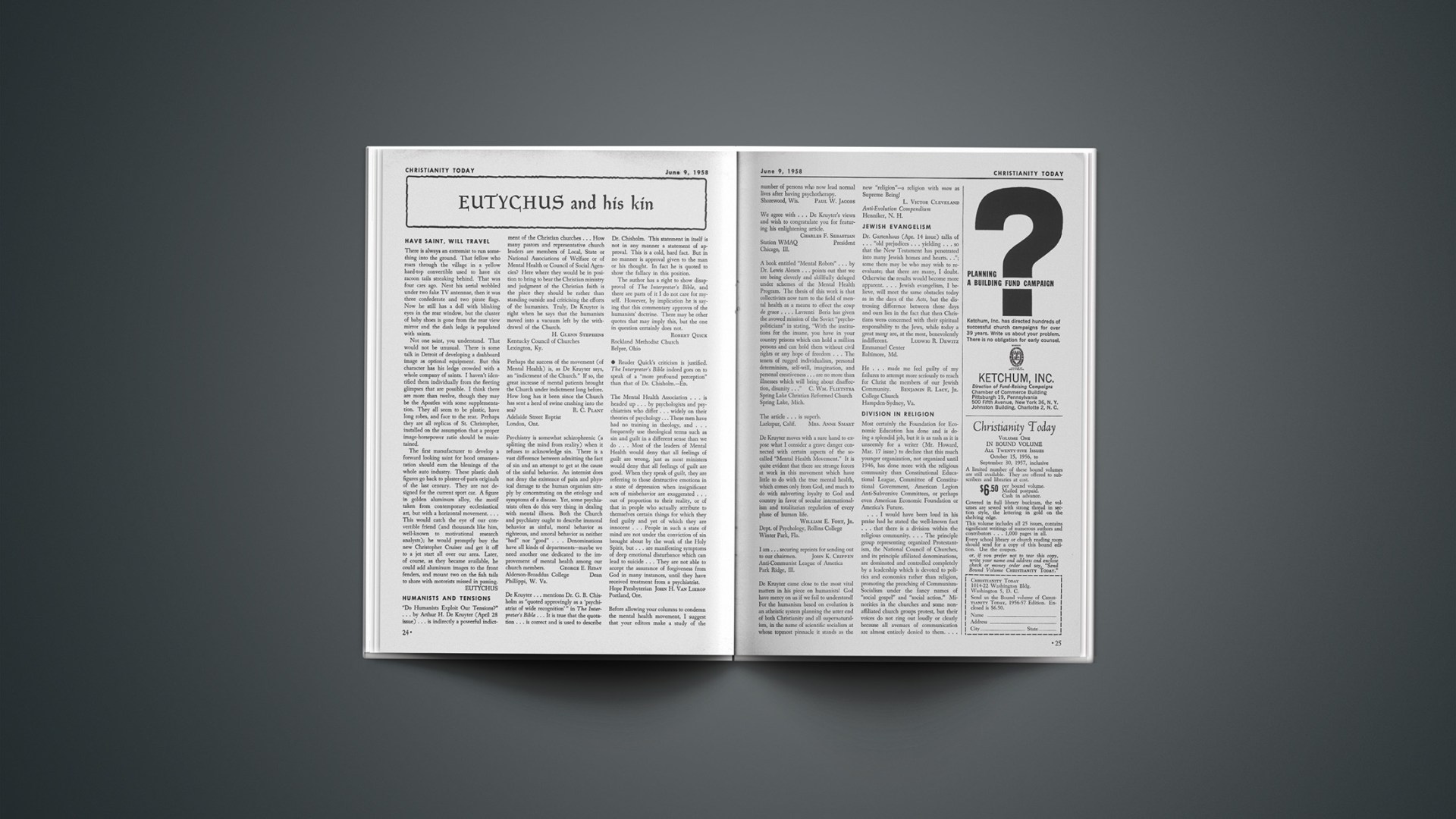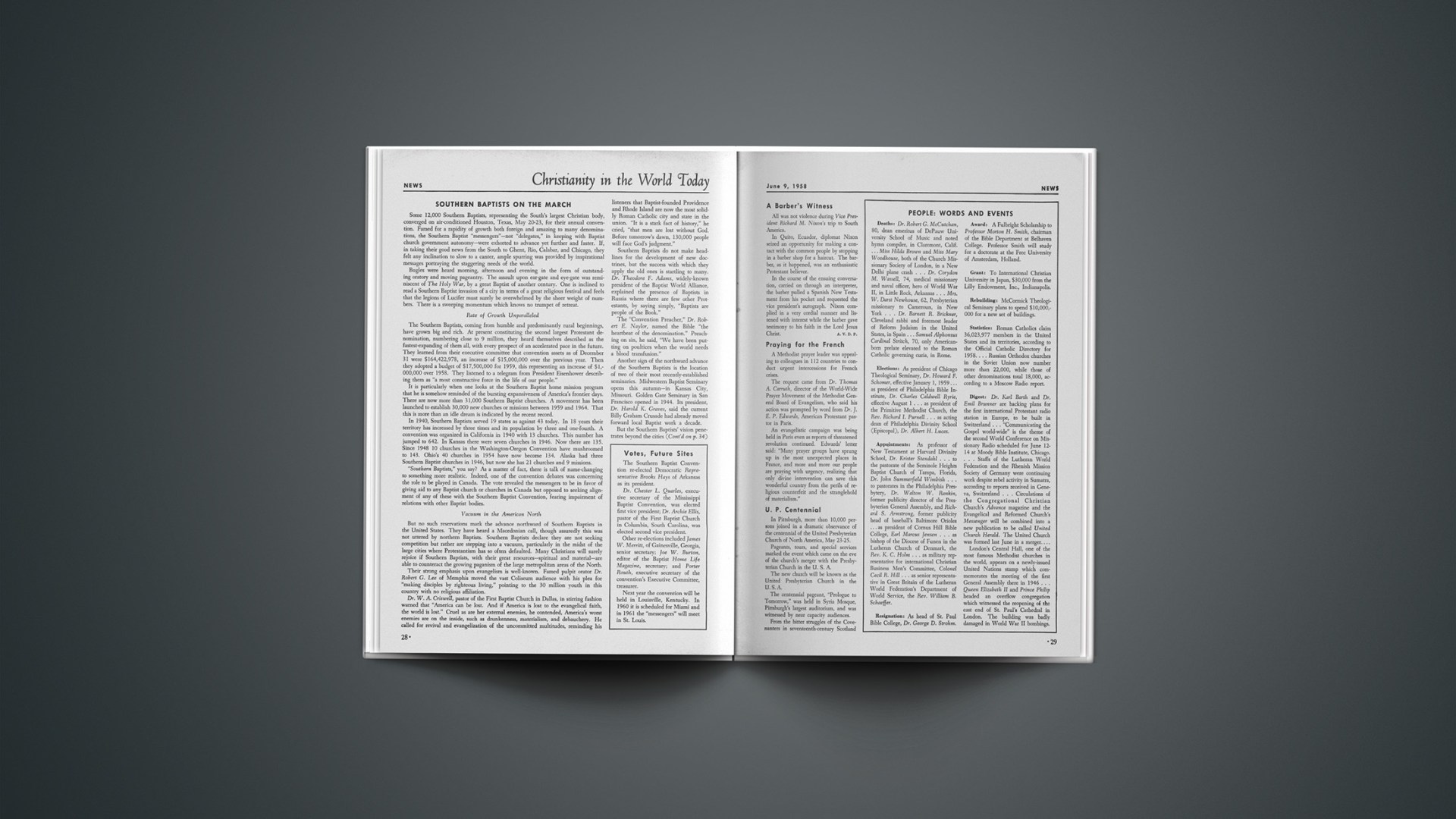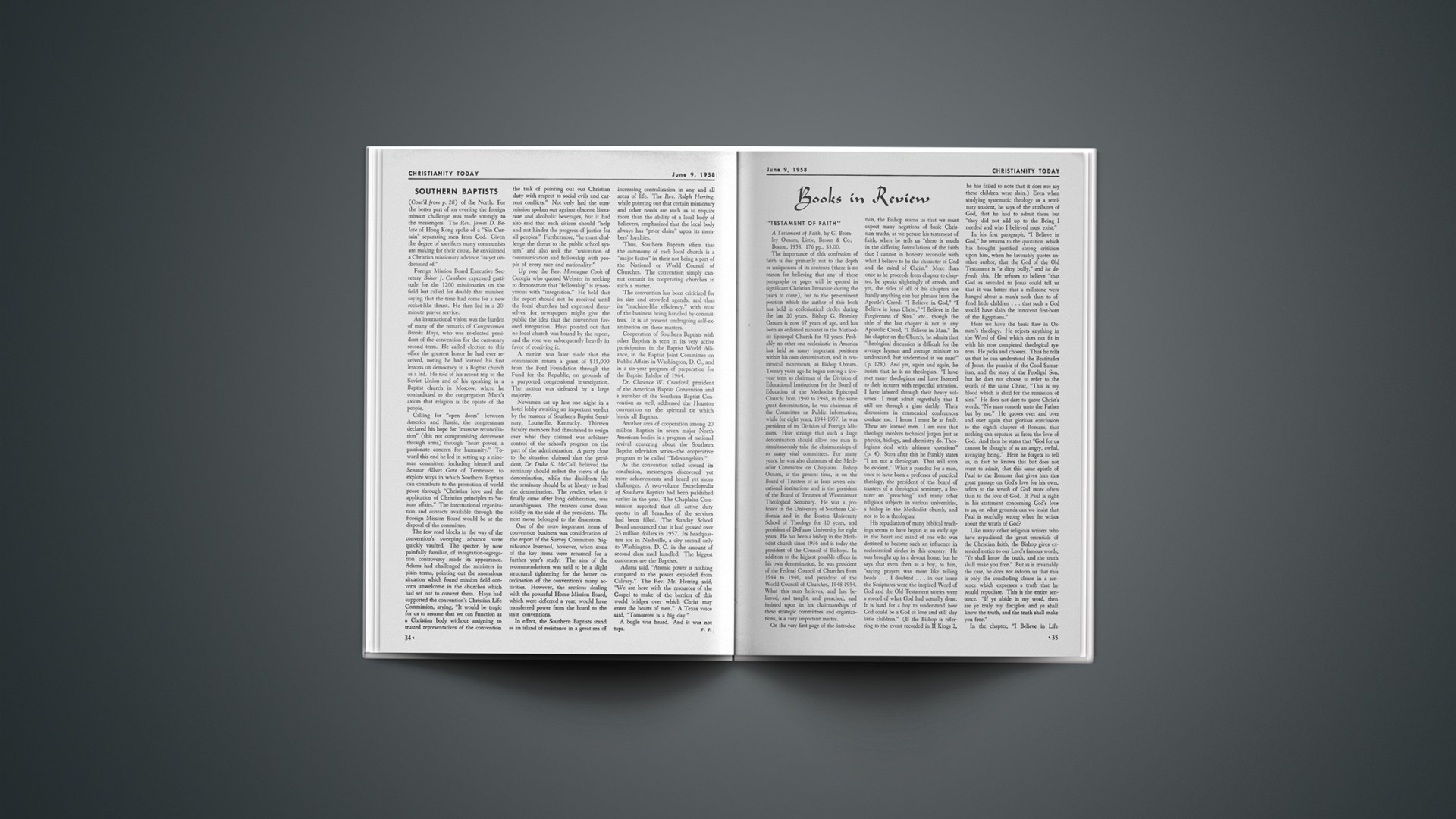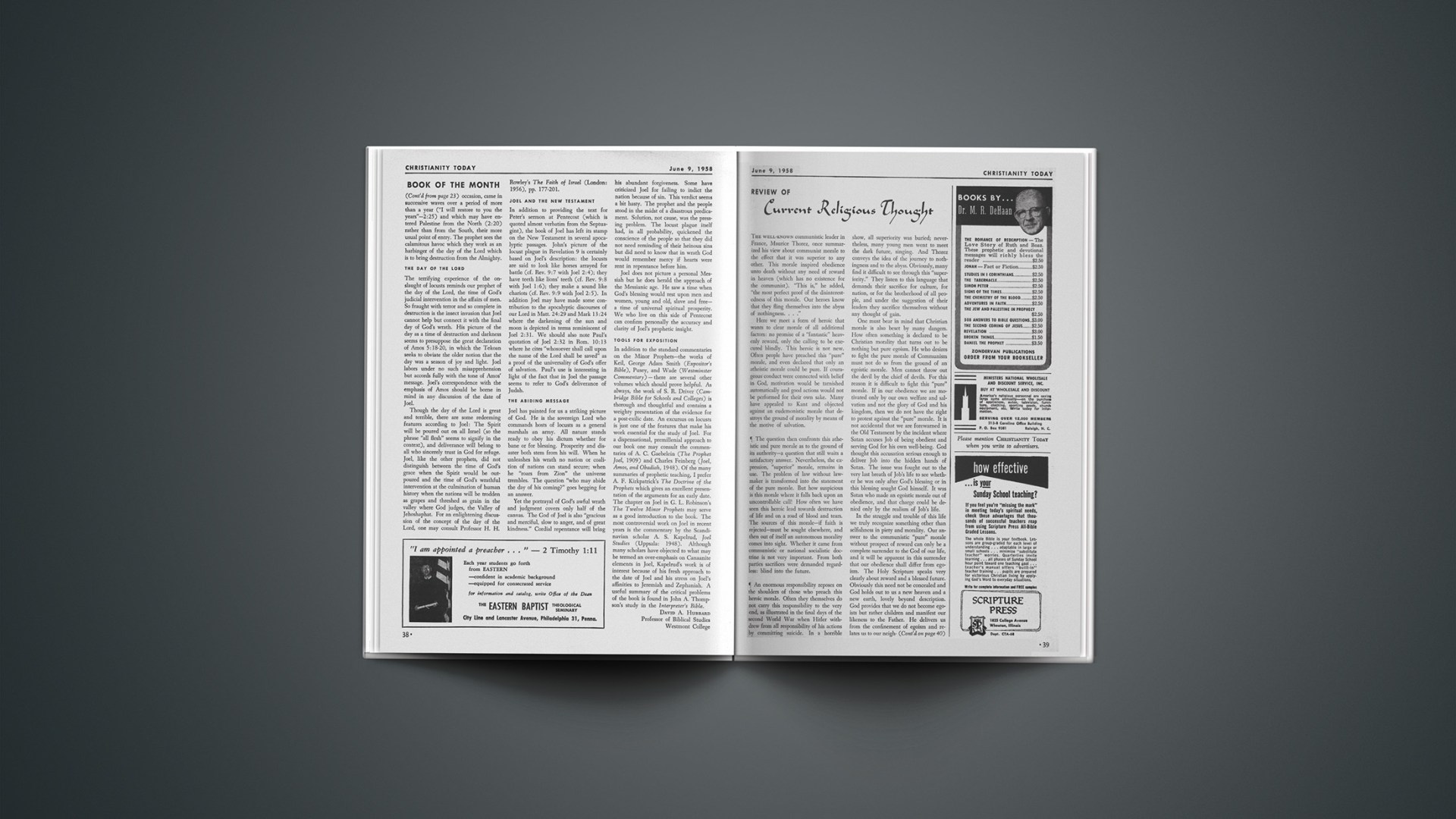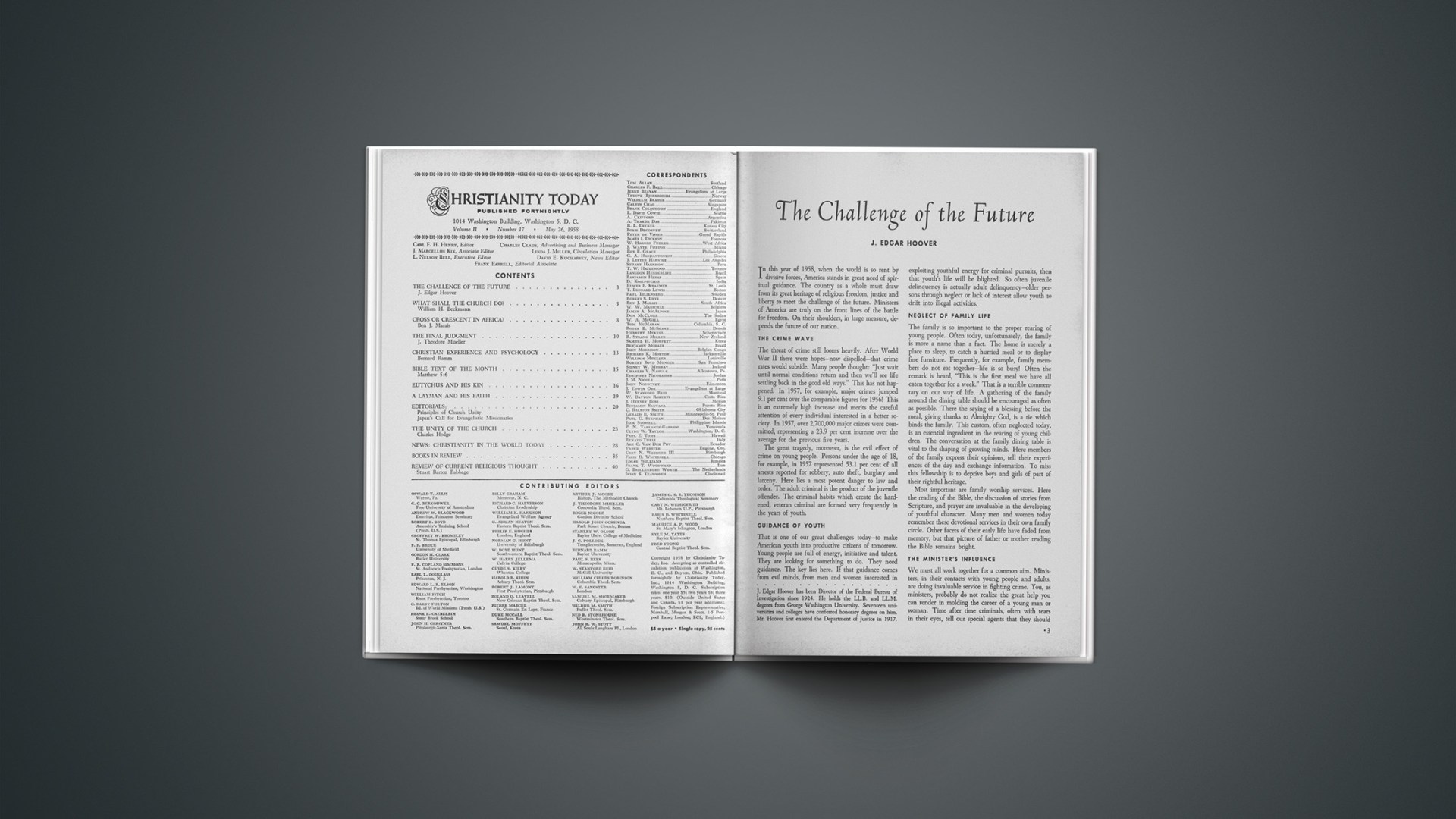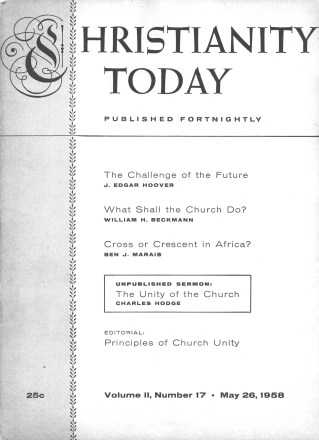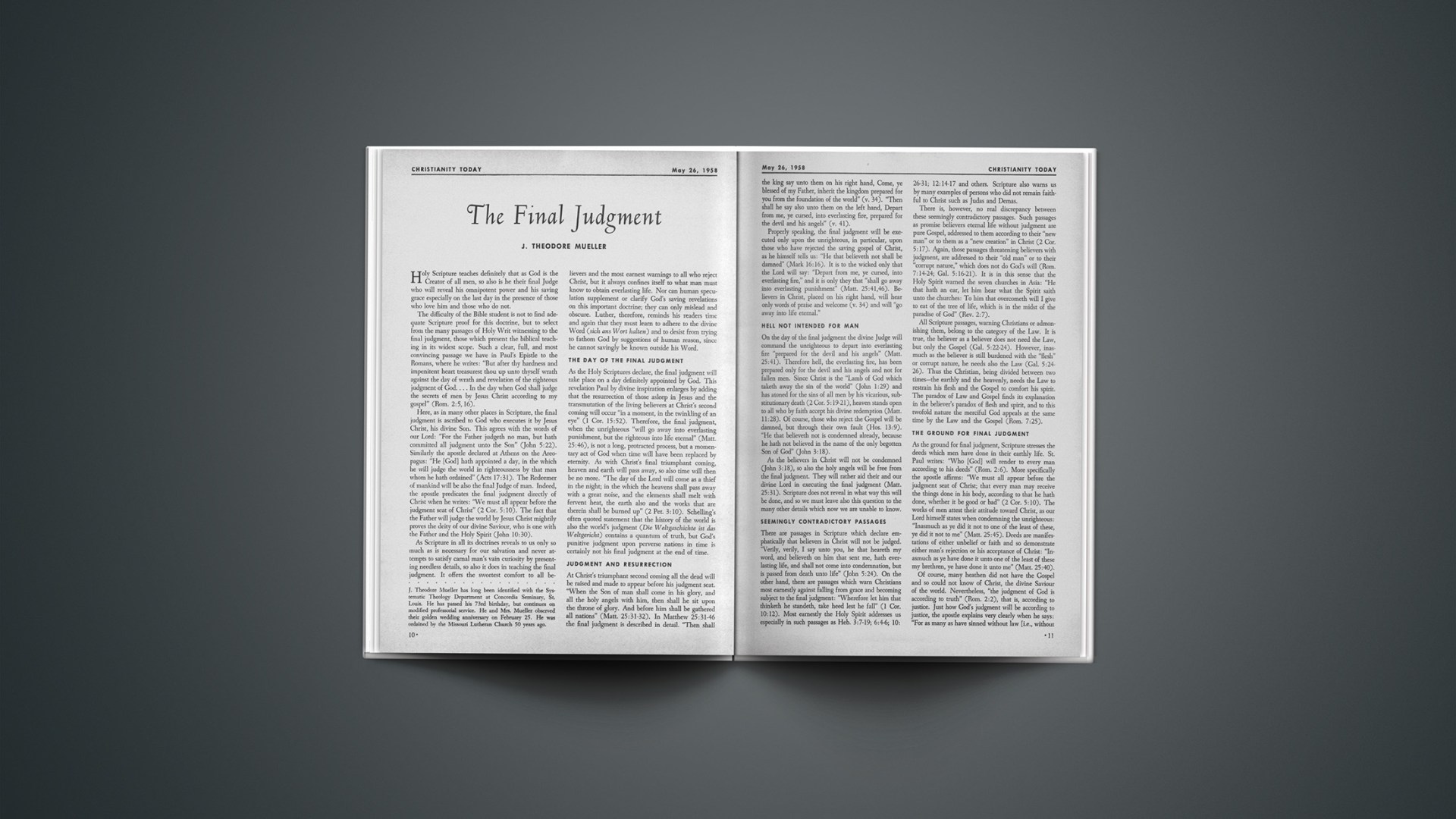Evangelism has come upon a popularity that is truly amazing. Reaching the unconverted, a responsibility long neglected by major denominations bent chiefly upon social action, today is becoming a primary concern of the Church. The National Council of Churches has elevated the “dignity” of evangelism by the recent appointment of a commission to study “the need, nature and purpose of evangelism for contemporary America.” While still giving priority to problems of a social nature, NCC is at the same time attempting to give direction to evangelism. Newspapers, religious and secular magazines, broadcasts, and vast popular assemblies in many lands bear strong witness to the current acceptance of this movement. This remarkable religious manifestation has aroused considerable public and private debate as to its methods, depth, and permanence.
Many factors contribute to this signal resurgence of evangelism. Surely the astonishing success of the Billy Graham Crusades is one, and it has given startling evidence that individuals are hungering and thirsting for a knowledge of salvation. Another is the depressing realization that the Church is simply an irrelevant institution to a vast number of people. And this is true in spite of the effort which the Church has made to “modernize” her message for the sake of relevance and palatability to twentieth century thinking. The third reason is a spiritual longing in the hearts of people, engendered by a sense of insecurity and by the absence of authoritative preaching in many churches. However, regardless of what may have revived all this new interest, it is certain that evangelism presents the Church today with a wonderful opportunity to extend a witness and an influence.
One cannot help observe that the Church thus aroused, could, if she would, take advantage of the favorable climate for evangelism. However, signs are not lacking to indicate a disinterestedness and even antagonism on the part of many. While a number indignantly protest that evangelistic effort is the proper function of the Church and should be Church-related, few are assuming the responsibility beyond criticizing the efforts already being made. On the other side, of course, are congregations preferring to keep a status quo rather than reaching out to the unchurched with the Gospel. An old minister of one of these congregations stated the problem: “Christ called me to be a fisher of men, but my congregation has always wanted me to be the keeper of an aquarium.” It is a requisite to any effective outreach that the Church be recalled to her God-given mission, and that she be fired with a zeal for winning the lost. The spiritual life of the Church must be revived before an effective impact can be made on unregenerate society even though the present environment is so favorable.
Because of the popularity of evangelism at the present time, church boards and church councils are chafing to give what they feel is proper direction to this movement. This constitutes a real danger since some have not evidenced real knowledge of biblical evangelism. Shifting gears from social action to evangelistic action may mean nothing more than borrowing techniques that have previously failed to stimulate the grass roots of the churches. At the last General Assembly of the National Council of Churches several secretaries aired the grievance that their efficient and well-planned programs were ignored at the local level. Also, technicians of ecclesiastical machinery have frequently thought in the category of “organization” with little concern for theological content. And organization without the true proclamation of the Gospel avails nothing. Unless they are willing to show more knowledge and concern for biblical theology than they have shown hereto, about the last that should lead in the Church’s evangelistic outreach are expert secretaries and organizational men.
No deep, lasting, or effective impression will ever be made on the twentieth century aside from that of a true biblical theology. Techniques and methods toward this objective will always remain of secondary importance. But where on the present scene can one turn for this kind of clear definition of the content of the Gospel? Doubt and uncertainty are emanating from many theological seminaries. The theological world is in a period of transition and confusion. Do Barth, Tillich, Bultmann, or Niebuhr vanquish the present chaos or add greater perplexity? The words of Jesus and his apostles are no longer viewed as authoritative, and the teachings of Scripture apparently must be sifted through the sieve of twentieth century rationalism, experience, or subjectivism. Can anything vital and certain remain through a reiterative process like this?
Denominational leaders fight shy of adopting the theological content of traditional evangelism. Their contention is that that is outmoded, and the acceptance of it would return the Church to a type of message repudiated a generation ago. They do not want the Gospel preached in terms of “a plan of salvation,” for they refuse to abide by the concept of reconciliation as a “transaction.” While more are inclined to acknowledge the sinful nature of man than they were before, they still deplore the Reformation emphasis on the total spiritual depravity of man. For example a recent NCC brochure, “The Good News of God,” states that there is “no need to assert man’s fall from original perfection into total depravity, or a physical inheritance of guilt by children yet unborn” (p. 12). They abhor any thought of dividing the world into “the saved” and “the lost.” They scorn the doctrine of substitutionary atonement and recoil at the idea of being saved “by the blood of the Lamb.” All this, they maintain, is the blunt and hackneyed terminology of “old-fashioned” evangelists and quite unacceptable to the modern mind.
Acknowledgement must certainly be made that orthodox evangelism has at times erred in thinking that the mere inclusion and repetition of certain biblical phrases constitute a gospel message. The phrase, “ye must be born again,” for instance, has very little significance unless explained as Christ did in John 3:3–21. Merely urging people to “believe on the Lord Jesus Christ” is insufficient unless one further expounds the Word as did Paul and Silas according to Acts 16:32. The “blood of the Lamb” does cleanse a man from the guilt and power of sin, but it is the evangelist’s responsibility to show, as did the prophets and apostles, how this effects personal salvation. If those who proclaim the Gospel would study more deeply in the Scriptures, much criticism would be avoided, and the “offence of the cross” would be more keenly understood and firmly asserted.
What the history of evangelism has definitely proven is that God signally blesses the preaching of truths that are based on the authority of his Word. Since the first century there has never been a more powerful spiritual awakening than the Reformation. To this day every country, village, town, and city Protestant church gives at least some witness of the impact which the Reformation made upon the world. God honored the proclamation of the Holy Scripture as the sole authority for faith and life, of justification by faith alone without any merits of good works, and of the priesthood of all believers. Every great religious movement since that time has stressed these three Reformation principles as well as the peculiar doctrines of man’s spiritual depravity, Christ’s divinity, the necessity and benefits of the blood atonement, the essentiality of repentance and conversion, and sanctification which is the work of the Holy Spirit. Evangelism can only prove effective in the transforming of people’s lives and the melioration of society as these sound biblical doctrines are irrevocably established. Neglect of biblical teachings, peculiar to the work of conversion, will cause the Church to fail in this opportune time of presenting the saving message of Christianity.
Through all these doctrines, however, the personal radiance of Jesus of Nazareth, the living Christ, must be seen. Faith respects the person of Christ and not merely his historical personage as recorded in Scripture; that is, it is much more than a belief in written testimony or biblical doctrine—it is a trust in the person who is presented by Scripture and by doctrine. Faith apprehends Christ as the living present Saviour. The written Word, empowered by the Holy Spirit, leads men to faith in the Son of God as Saviour from the guilt and power of sin. And evangelism, therefore, employs scriptural phrases, it proclaims gospel truths in the authority of the infallible Word, and it presents the “offence” of the blood of Christ. But in all this it pleads for the sinner to come to Christ himself in order that he might appropriate His blood and through Him approach God. The person of Christ is honored in true evangelical preaching.
Nothing but the truth of the revealed Gospel can be instrumental to the conversion of souls which is the task of evangelism. Any willful suppression or any compromising statement of biblical truth will vitiate the message of the Church. Without the theology of the revealed Word, evangelism will make no inroads upon a materialistic and pagan age. Men must humble themselves and receive with meekness the inscripturated Word as did Timothy: “And that from a child thou hast known the holy scriptures, which are able to make thee wise unto salvation through faith which is in Christ Jesus” (2 Tim. 3:15). Liberalism proved ineffective because it divorced itself from biblical theology.
Doubts concerning the traditional evangelical doctrines will only play havoc in the lives of individuals and the growth of the Church. This was dramatically illustrated by Charles Templeton who recently left the ministry of evangelism to begin a new life as television playwright and performer. In an interview appearing in The Globe Magazine of Toronto, he said, “If you’re going to preach effectively, you have to have conviction. My convictions as to some aspects of Christian doctrine became diluted with doubt. I don’t say I am right and all others are wrong. But feeling as I do, I could not go on in the ministry. So I left.” His doubts appeared in his book, Evangelism for Tomorrow (Reviewed in CHRISTIANITY TODAY, Feb. 17, p. 16). It is significant that one of these doubts concerned the infallibility of the written Word—the mother of all doubts. Satan knew this when he replied to Eve, “Yea, hath God said?”
Thus hath God spoken. And that not only confirms true evangelism with the stamp of God, but brings hearers before the awful majesty of his presence. “For the word of God is quick, and powerful, and sharper than any two-edged sword, piercing even to the dividing asunder of soul and spirit, and of the joints and marrow, and is a discerner of the thoughts and intents of the heart” (Heb. 4:12). Without the authority of the Word of God, evangelistic effort is weak, flabby, and ineffective. The twentieth century church has lost the note of authority and must recover it if she is to influence for good the life and thought of the present generation which is in a mood to listen to those who expound the way of eternal life.
Dr. Colin Williams, professor of historical theology at Garrett Biblical Institute, referred to the confusion that exists today in a recent address to a local Council of Churches in Michigan. He said, “There is a crisis in evangelizing because we’re not sure why we are evangelizing. A generation ago the motive was fear; we felt that if men did not become Christianized they would go to hell … This motive was replaced by one that nonbelievers are missing the benefits of a Christian life, such as a higher civilization … Now we’re coming to the conclusion that we must evangelize because of the major motive power in Christianity which is love.” Evangelical Christianity, however, is sure why it must evangelize and always has been. It has the revealed message of salvation; it has a commission to proclaim that message to every creature in every nation; and it has the love of Christ that constrains witness of the Gospel—the power of salvation.
Never in the past several decades has the Church of Jesus Christ such a friendly environment to proclaim the Gospel of her Lord. Business and professional men, laborers and skilled workers, teachers and students, statesmen and politicians—people of all levels—are willing to listen to the message of the Church. What an indictment the present generation will present against those who represent Christianity, if the visible church continues to remain in doubt concerning her message and gives forth an uncertain sound! Now is the time to leave the wisdom of men—though set forth by respected and popular theologians—and proclaim the revealed gospel of Christ and him crucified.
In the present decade ecumenical forces have purposed to synthesize the World Council of Churches as a symbol of ecclesiastical unity, and the International Missionary Council as a symbol of ecclesiastical mission. This projected merger, it is indicated, would assimilate the effective elements of Protestant unity into one vast and vital world enterprise of Christian faith and action.
That the ecumenical movement’s leadership places a one-sided emphasis on unity at the expense both of the theological and of the evangelistic and missionary responsibility of the church is not an unfamiliar charge. The present WCC-IMC merger simply multiplies the evidence of such scrambled values and priorities.
Proponents seem bent upon the merger’s accomplishment despite the detachment of the Congo Protestant Council, one of the most evangelical agencies identified with the International Missionary Council, and the grave reservations of the other effective missionary agencies. Vigorous evangelical forces heretofore cooperating with the International Missionary Council have openly indicated that to integrate the IMC and WCC would mean their separation from the IMC. The proposed merger therefore clearly undercuts the avowed devotion to mission.
The ecumenical movement is cheapening the claims of unity and mission in several ways. One unfortunate example involves the Eastern Orthodox Church in the World Council of Churches. That Greek Orthodoxy has shown little more enthusiasm for Protestant missions than Roman Catholicism is well known. In fact, both Eastern Orthodoxy and Roman Catholicism consider Reformation Protestantism a lamentable development; they disagree only in how its direction should be reversed. In the WCC the Greek Orthodox Church has been consistently represented as seeking to advance its claim of being the pure church in which alone true Christian unity may be found as over against the pretensions of Protestantism. Historically, moreover, the Eastern Orthodox Church has shown little missionary zeal. Curiously, however, in the contemplated WCC-IMC merger some Protestant observers see hope for developing a growing missionary interest among the Eastern Orthodox ranks. If such missionary effort proceeds merely from Eastern Orthodox motivations, however, it can only give Protestantism cause for anxiety rather than for encouragement. Some others stress that persecution of evangelical effort in Greece by the Orthodox Church is now a thing of the past. But religious tolerance, even if permanent, is far removed from unity in mission. In fact, any ecumenical composite that merges Greek Orthodoxy and Protestantism has not dealt profoundly with the issue of the nature of the Church, nor with the question of its mission.
Any soundly biblical venture throbs to a unity of mission. The WCC-IMC merger conspicuously tests, rather, unity within mission. What can be said for Protestant unity in mission that simultaneously embraces the anti-Protestant evangelistic attitudes of the Greek Orthodox Church on the one hand and offends the evangelical consciousness of the Congo Protestant Council on the other?

